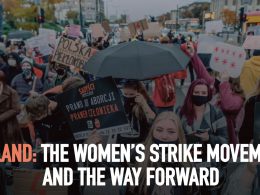By Keishia Taylor
The end is in sight – over a million Irish residents, or just over a quarter of the adult population, have received at least one dose of the Pfizer-BioNTech, AstraZeneca, or Moderna vaccines. The rollout is underway, despite various complications. After some uncertainty around extremely rare blood clots, the Johnson & Johnson vaccine has now been approved for those over the age of 50 and AstraZeneca for those aged 50-70.
However, the vaccination cohorts drawn up by the HSE are facing severe criticism as they broke the commitment given by government to include essential frontline workers who are exposed to the virus, such as teachers and SNAs and the (necessary) age restrictions around the Johnson & Johnson and AstraZeneca vaccines have caused huge disruption. But the most significant barrier is the slow production of vaccines – deliveries of millions of AstraZeneca doses put us significantly behind schedule.
The Taoiseach has insisted that the target of having 80% of the population vaccinated by 1 July is still in reach. But the phrase “back on track” is starting to ring hollow as the rollout is repeatedly re-organised and successive targets are missed.
Delays
While the research and development of the vaccines surpassed expectations in terms of timescale and efficacy, the production and distribution of vaccines are now posing huge challenges. Companies like Pfizer, Johnson & Johnson and AstraZeneca retain ownership and control over the vaccines they developed, despite having been funded by vast grants from governments.
AstraZeneca was due to deliver 80 million doses to the EU in the first quarter of 2021, but only provided 30 million, citing “production problems.” The European Commission, on behalf of all 27 members including Ireland, is now suing AstraZeneca for breach of contract due to the delays.
The antagonism is at least partly fuelled by power dynamics relating to Brexit and suspicions that AstraZeneca was giving the UK preferential treatment, although it has transpired that the UK actually received several million doses exported from the EU. While the capitalist classes engage in these squabbles, working-class people are desperate to get vaccinated and minimise their risk of illness.
Emergency production
The large-scale vaccine production that is urgently needed is being limited by the pharma companies themselves. In March, the Irish government offered Pfizer state aid to set up production of the vaccine in Ireland but this offer was refused, despite Pfizer already having other factories here. This demonstrates the weakness of the Irish capitalist establishment, which is so heavily reliant on these multinationals that it is unwilling to stand up to them.
Producing a novel and complex mRNA vaccine requires extremely specific expertise and equipment to set up, but immediately investing in this technology and refitting existing manufacturers to produce vaccines, components, low-waste syringes, etc. would not only provide vital supplies for the vaccine rollout now but also for future vaccines and medicines. Instead, for example, pharmaceutical company Viatris announced only months ago that it will be closing its manufacturing facility in north Dublin over the next year with the loss of 440 skilled jobs in order to take advantage of lower wages in Hungary.
The Irish government could have required pharmaceuticals and manufacturing plants to prioritise the products necessary to tackle the pandemic, but instead permitted companies to continue to focus on their own interests. Even the US, under both Trump and Biden, has used the wartime Defence Production Act to direct private companies to produce PPE and vaccines “in the national interest”. Ireland is one of the major global pharmaceutical and medical technology players, yet the Irish government refuses to interfere with the business of private enterprises, stunting its own ability to deal with the pandemic.
Intellectual Property
A major block to access to vaccines is the idea that the invention of the vaccines themselves and the processes to produce them are owned by private companies. Intellectual property rights and patents allow a few corporations to hold a monopoly on the vaccines, and are a decisive barrier to producing vaccines on the scale they are needed.
A number of countries, such as South Africa and India (where there are currently 3,000 deaths a day), are seeking an IP waiver from the World Trade Organisation to enable them to produce generic versions of the vaccines. Predictably, most of the wealthy capitalist countries are vetoing this request to safeguard their own industry and Ireland is among those leading the charge. The Financial Times reported that vaccine producers claimed the IP waiver could hand novel medical technology to China and Russia, allowing them develop “other vaccines or even therapeutics for conditions such as cancer and heart problems in the future.” These companies are essentially admitting that they want to stop medical advancement if it is developed by Chinese or Russian companies. They are sacrificing human lives and health for the sake of capitalist competition and the inter-imperialist rivalry between the major world powers.
Working-class control
It is entirely reasonable that in a crisis such as this, governments take control of vital industries and that patents on life-saving medicines are removed. Taking these steps to end the pandemic is of course in the interests of the masses whose lives are impacted, but also the capitalist governments themselves who seek to re-open the economy and “return to normal,” yet they are unwilling to take such measures. Through these decisions, and others they have made, the Irish government is responsible for unnecessary deaths in Ireland, and contributed to the apocalyptic situation in India, for example.
State-directed production of generic vaccines is an urgent necessity and would be a huge step forward in tackling the pandemic. This could be done on the basis of coordinated global planning and the democratic input of the workers who are experts in their fields, and the wider working class whose human decency and solidarity would seek the fairest and fastest solution to the coronavirus crisis.
The coronavirus crisis is just one of many that the working class is facing. The crisis of healthcare, housing, precarious and low-paid work, gender violence, and climate destruction all need immediate action that the anarchic, competitive, and ruthless capitalist market is not capable of. We need socialist change. Only democratic planning of production and workers’ control over the organisation of society can provide a real solution to this multitude of emergencies.












